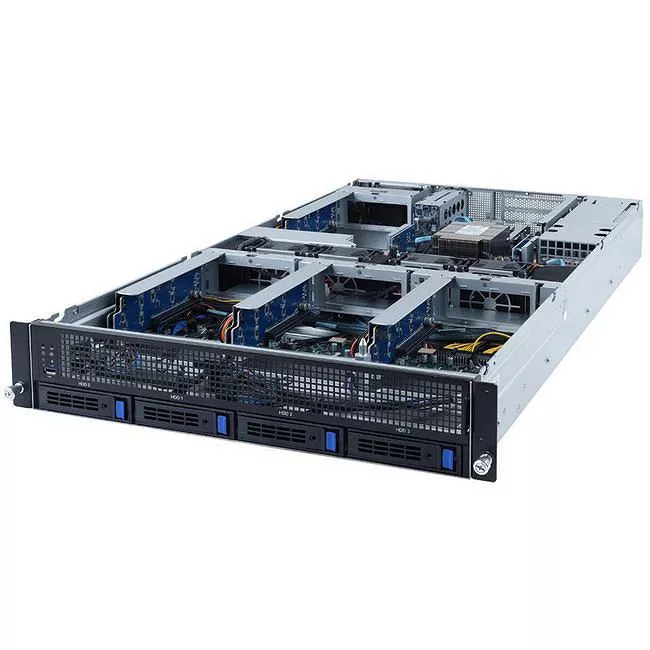GIGABYTE G242-Z11 2U Rack Barebone - 1x AMD EPYC 7002 Socket SP3 - 4x GPU (Gen4) - SOC
SabrePC B2B Account Services
Save instantly and shop with assurance knowing that you have a dedicated account team a phone call or email away to help answer any of your questions with a B2B account.
- Business-Only Pricing
- Personalized Quotes
- Fast Delivery
- Products and Support

$3,257.77
GIGABYTE G242-Z11 2U Rack Barebone - 1x AMD EPYC 7002 Socket SP3 - 4x GPU (Gen4) - SOC
AMD EPYC™ 7002 Series Processor (Rome)
The next generation of AMD EPYC has arrived, providing incredible compute, IO and bandwidth capability - designed to meet the huge demand for more compute in big data analytics, HPC and cloud computing.
- Built on 7nm advanced process technology, allowing for denser compute capabilities with lower power consumption
- Up to 64 core per CPU, built using Zen 2 high performance cores and AMD's innovative chiplet architecture
- Supporting PCIe Gen 4.0 with a bandwidth of up to 64GB/s, twice of PCIe Gen 3.0
- Embedded security protection to help defend your CPU, applications, and data
GIGABYTE Management Console
GIGABYTE server utilizes the AMI MegaRAC SP-X solution for BMC server management, has a browser-based graphical user interface, and is feature-rich and easy to use.
- RESTful API support includes the latest DMTF standard of Redfish. Allows integration with 3rd party applications for server management
- Including HTML5 based iKVM remote management client, no need to purchase other additional licenses
- Detailed FRU information from SMBIOS
- 10 to 30 seconds pre-event automatic recording function
- SAS / RAID controller monitoring function
GIGABYTE Server Management (GSM)
GIGABYTE Server Management (GSM) is GIGABYTE's proprietary multiple server remote management software platform, available as a free download from each GIGABYTE server product page. GSM is compatible with either IPMI or Redfish (RESTful API) connection interfaces, and comprises the following sub-programs:
- GSM Server, a software program with an easy to use browser-based GUI to enable global remote monitoring and management of multiple GIGABYTE servers via each server node's BMC.
- GSM CLI, a command-line interface program to enable global remote monitoring and management of multiple GIGABYTE servers via each server node's BMC.
- GSM Agent*, a software program installed locally on each GIGABYTE server node that retrieves additional node information (CPU/Mem/HDD/PCI/...) from the OS and passes it to the BMC. This information can then be utilized by GSM Server or GSM CLI.
*GSM Agent is currently compatible with Avocent MergePoint IPMI 2.0 BMC firmware, but not yet compatible with Megarac SP-X BMC firmware. - GSM Mobile, a remote server management mobile APP, available for both Android and iOS.
- GSM Plugin, a plugin that allows the user to manage and monitor GIGABYTE server nodes within VMware's vCenter.
Intuitive & Informative User Interface
Starting from the GSM Server dashboard, the user can clearly understand the status of each node in the IT environment, including:
- Node connection status (system is online/offline)
- Node hardware sensor status (to detect hardware anomalies). Sensors measure voltage, fan speed and temperature
- Node usage rate status (allowing you to timely allocate more resources when they are needed), including:
- Power consumption
- Disk/RAID usage information
- Memory usage rate
- CPU usage rate
- Network card / PCI information
The user can also perform various management functions, including:
- Node remote access
- Power on / off / reset
- Launch iKVM
- Reboot BMC / BMC Account Configuration
- Network Configuration
- IPv4/IPv6 setting
- Alert Management
- SNMP trap setting
- Platform events filters

